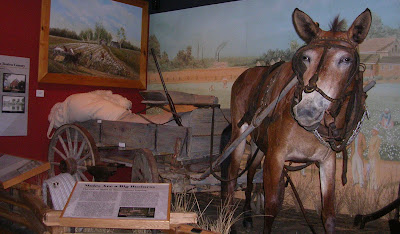We can officially say that we've been to "The Crossroads" - the place where legendary blues singer Robert Johnson sold his soul to the devil and went on to fame. They say it happened one night where the casino roads now cross in Tunica County, Mississippi. This is one of many stories of the folks who lived and learned and sang about it the Mississippi Delta. It's been a lot of fun delving into a few of them for the past week. I said I would share, so here goes.
Continuing our quest to read a more of the Blues Trail markers, we found this one at the Tunica Visitors Center that gives an overview of this historical project.
From there, we went only about a mile west to Old Highway 61 and found another. Here's a bit of the story of Son House from the marker placed where his shack used to stand in Robisonville. He and other blue singers from the area performed many times at parties at sharecroppers' houses or local dances while working at the local cotton plantations. His rediscovery happened in the 1960s when he began making recordings after moving north.
During our wanderings in the area, we found the Tunica Museum and decided to take a little time to see what it might hold. There we learned all about the history of this county, from ancient Tunica Indians to blues artists, from reconstruction to desegregation, from cotton to casinos. A portion of the museum played out the role of cotton in the lives of the people. Many blues artists grew up working the plantations, learning to sing and play the blues from others, singing on the street and in the local juke joints. We also learned that between 1913 and 1920 several factors, a depression, boll weevil infestation, flooding, and the lure of higher-paying industrial jobs up north, changed the face of the cotton business. These circumstances resulted in a tremendous exodus. Of course, the blues men took their experiences and memories with them. This is how many of the Chicago blues artists came to be there.
Our travels in the area, of course, included discovering good southern cooking. One of these eating (and music) places was the Hollywood Cafe, another stop along Old Highway 61, just off Casino Blvd. The building sits there all by itself just tempting you to try it. This is an old establishment that was in danger of being closed a few years ago when two local engineers came to the rescue. They have some mean catfish and purport to be the "original home of the fried dill pickle." We must confess that we had both of these items and they are super.
Soon after our lunch, we were reading another Blues Trail marker ten miles south in downtown Tunica. This one is the story of the "first local millionaire," Hardface Clanton. He was quite industrious. His marker gives the basic story.
But there's more interesting details about this guy on the back of the sign. If you have an interest, the website contains all of the stories on these Blues Trail markers.
http://www.msbluestrail.org/blues_trail/
But our blues travels aren't over yet. I'll complete this episode in a couple of days. Stay tuned.





The information here is great. I will invite my friends here.
ReplyDeleteThanks